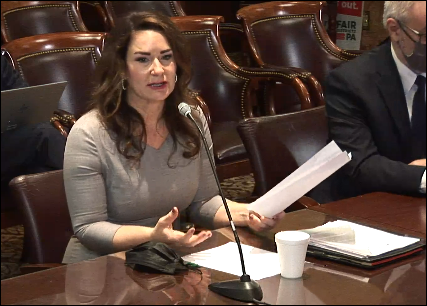By Victor Skinner | The Center Square contributor
(The Center Square) – Representatives from the Pennsylvania Department of Labor & Industry and the Office of Administration discussed ongoing fraud and other issues in the commonwealth’s unemployment system Thursday during a House hearing.
Pennsylvania Secretary of Labor & Industry Jennifer Berrier told the House Labor and Industry Committee that “overall the (unemployment compensation) system is in a good place,” but acknowledged a raft of ongoing issues, from hundreds of millions of dollars stolen through fraud to large backlogs of unresolved claims and fraud cases.
Berrier said the unemployment compensation system has processed more than 611,000 claims since the modernized system went live in June, paying out about $3.4 billion in benefits. During the height of the pandemic, the department faced a backlog of 300,000 nonmonetary determinations, or those involving eligibility, that since has been whittled down to 95,000, she said.
“Currently our examiners are issuing between 17,000 and 19,000 determinations a week, and our system is able to issue a couple thousand, depending on the issue,” Berrier said.
The secretary also addressed fraud from identity theft and bank hijacking publicized by the media. Berrier said the department implemented ID.me verification a month after the new system launched, but “we still continue to struggle with fighting fraud, but also continuing to pay claimants in as timely way possible.”
Berrier said the efforts have helped, though a recent increase in seasonal workers applying for benefits has resulted in an uptick in fraud in recent weeks.
“I think what we’re finding is, especially with these seasonal workers, they’re finding that they’re the victims of identity theft from when our system first went live,” she said. “Also we’ve had issues with bank hijacking, which I know has been relatively new.
“But I am happy to report that we’re seeing noticeable decreases in fraud reports,” Berrier said, “which means that the levels of security that we’re implementing are working.”
There is a backlog of 37,000 pending fraud cases.
Berrier highlighted an Independent Fiscal Office report that showed traditional unemployment benefits paid out to fraudsters from March 2020 through the third quarter of 2021 was about $570 million, or about 6.3% of the typical payments made during that time frame.
An ongoing law enforcement investigation is examining the fraud, while Labor & Industry is developing free credit monitoring for all claimants.
Several lawmakers questioned how claimants would know whether they are the victim of an unemployment fraud scheme. Berrier said claimants who receive a 1099G tax form but have not received payment could be a victim of fraud, but “unfortunately at this point it’s complaint and response.”
Other lawmakers questioned why the unemployment system has not implemented more stringent identity authentication.
John MacMillan, chief information officer for the Office of Administration, told the committee “two-factor authentication is a requirement in the contract” with the system vendor, but “we’re trying to balance out the delivery of benefits to citizens and not make it burdensome.”
The task is complicated by the fact not all claimants have access to cellular phones or email necessary for the two-factor authentication. Instead of authentication, the system is relying on the ID.me verification, which is less burdensome, he said.
“We’ve turned up the layers of verification four or five times along the way,” MacMillan said. “And what we’ve seen … is a decrease in the number of fraudulent claims.”
Rep. Ryan Mackenzie, R-Lehigh, also questioned Berrier on why Gov. Tom Wolf did not propose the use of federal pandemic relief to pay down a $700 million debt in the unemployment trust fund as other states have, noting the cost will be passed on to employers if it’s not resolved.
“The governor is my boss,” she said, “I stand by the budget he presented.”
